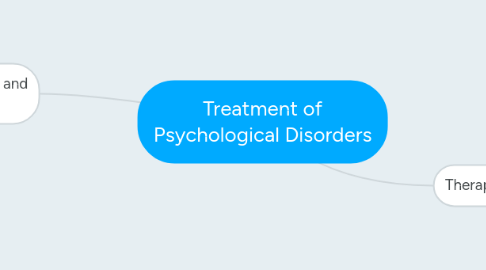
1. Evaluating Psychotherapies and Prevention struggles.
1.1. Does it work?
1.1.1. Outcome research
1.1.2. Clinicians perceptions
1.1.3. client's perceptions
1.2. The relative effectiveness of different psychotherapies
1.2.1. evidence-based practice
1.3. evaluating alternative therapies
1.3.1. EMOR - eye movement desensitization and reprocessing
1.3.2. Light exposure therapy
1.4. commonalities among psychotherapies
1.4.1. hope for demoralized people
1.4.2. a new outlook
1.4.3. empathetic, trusting and caring relationship.
1.4.4. therapeutic alliance
1.4.4.1. a bond of trust and understanding btwn a therapist and client. They work together to overcome the client's problem.
1.5. culture, gender and values in Psychotherapy
1.6. preventing psychological disorders
1.6.1. resilence
2. Therapy
2.1. psychodynamic therapy
2.1.1. goals
2.1.2. techniques
2.2. humanistic therapies
2.2.1. insight therapies
2.2.2. client-centered therapy
2.2.3. active listening
2.2.4. unconditional positive regard
2.3. psychotherapy
2.4. the biomedical therapies
2.4.1. psychosurgery
2.4.1.1. magnetic stimulation
2.4.1.2. deep brain stimulation
2.4.2. electroconvulsive therapy
2.4.3. Alternative neuro stimulation therapies
2.4.4. Therapeutic Lifestyle change
2.4.5. Brain stimulation
2.4.5.1. lobotomy
2.4.6. drug therapies
2.4.6.1. pychopharmacology
2.4.6.1.1. the study of the effects of drugs on mind and behavior
2.4.6.2. antipsychotic drugs
2.4.6.3. anti anxiety drugs
2.4.6.4. antidepressant drugs
2.4.6.5. mood stabilizing medications
2.5. Eclectic approach
2.6. behavioral therapies
2.6.1. classical conditioning techniques
2.6.1.1. counterconditioning
2.6.2. exposure therapies
2.6.3. systematic desensitization
2.6.4. virtual reality exposure theory
2.6.5. aversive conditioning
2.6.6. operant conditioning
2.6.6.1. token economy
2.7. cognitive therapy
2.7.1. rational-emotive behavior therapy
2.7.2. aaron beck's therapy for depression
2.7.3. cognitive behavioral therapy
2.8. Group and family therapies
2.8.1. group therapy
2.8.2. family therapy
2.8.3. self help groups

